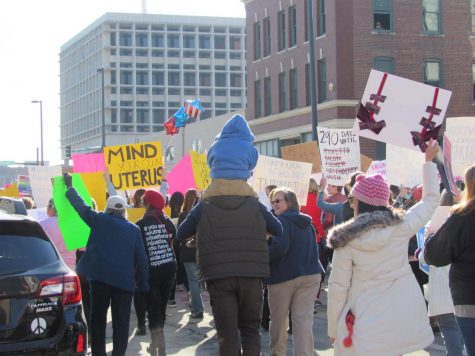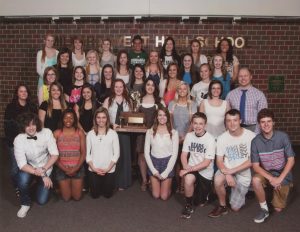Women’s Rights Aren’t Up for Grab
8,000 people gather in downtown Omaha to be heard
February 12, 2018

Diversity of protest
To fight like a girl, there are no weak punches, no hair pulling, no nail scratching and no flimsy kicks. There’s no such thing as getting tired easily or giving up. Fighting like a girl is hitting hard, hard enough to leave a mark. Today, women everywhere are showing the world what fighting like a girl really looks like and we are definitely leaving our mark.
Hundreds of thousands of people swarmed Washington D.C. and other cities all over the United States on Jan. 21, 2017, the day after President Donald Trump was sworn into office. They wanted to send a message to the new man in office and to make sure it is known that women’s rights are human rights.
Exactly a year later on Jan. 20, 2018, I was fortunate enough to participate in the Second Annual Women’s March in Omaha along with 8,000 others. For me, attending a Women’s March demonstrates my beliefs in reproductive rights, LGBTQ rights, equal pay, the right to hold office, disability rights, immigrant rights and environmental justice.
This years theme was “March on the Polls,” encouraged women to get involved in their city, in the government and if they couldn’t do that, then vote like it’s nobody’s business. As soon as my family and I got near the crowd we were greeted with tables registering women to vote and handing out pamphlets as to why they should. By making women aware of how important their vote is, and how important it is for us to be in office, it will be easier for us to have our own say in what we believe.
My mom has always done an wonderful job of being supportive of what I believe and encouraging me to always be involved. That Saturday, I was incredibly privileged to feel my heart was filled with complete empowerment, joy and utter heartbreak due to everything I saw and heard.
It’s 2018. The fact people still need to march for equal rights is incredibly frustrating.
From young boys holding their mother’s hands, to young girls marching arm in arm with their grandpa, everyone wanted the same thing: equality.
The speakers, Ashlei Spivey, program officer of the Peter Kiewit Foundation and Marta Nieves, a self-employed Human and Organizational Development consultant, both emphasized the fact that love is the strongest power between all of us, and if utilized correctly, we can accomplish anything.
Obviously, women have gained many rights since early American history. For example, in 1920, after about a century of protesting women finally gained the right to vote in the 19th Amendment. In 1936, United States versus One Package of Japanese Pessaries won judicial approval of medicinal use of birth control. In 1937, minimum wage laws were confirmed in Washington for women. The year following, the Fair Labor Standards Act established a minimum wage disregarding gender.
Although, these are a few promising signs, there are still some shocking statistics comparing women and men. According to thinkprogress.org, as of 2016 women earned roughly 79% of what men were making. This number means that for each dollar a man makes, women make 79 cents. To put it in a bigger picture, for every $1,000 he makes, she makes $790.
Time.com said in the occupational category of security, commodities and financial service sales agents there are 30% of women in the field. Those women make a median of $51,000. The 70% of men make about 92,000. They are doing the same job, yet at the end of the day we bring home an extremely different amount of money. If women are qualified enough to get the job in the first place, there is absolutely no reason this should be an issue.
Also, makers.com said that 62 million women are denied an education worldwide, every year an estimated 15 million girls under the age of 18 are married when they had little or no say in the outcome. One in three women globally have experienced either intimate partner violence or non-partner sexual violence in their lifetime. Plus, women serving in Iraq or Afghanistan are more likely to be raped by a comrade than killed by the enemy.
Statistics like these are what people need to be aware about. The more educated people are, the bigger an impact that can be made and the more inclined people are to make a difference
We are fighting to be heard. Women are not weak. We are not the type of people who can be ignored.
I encourage students to go out, get educated and become more involved as they grow. I’m not only talking to the girls reading this, but boys, too. Don’t let your mother, your girlfriend, or your sister become one of these statistics.







Jason Gaskin • Feb 24, 2018 at 8:08 pm
Fantastic piece Hannah!! I know your mom is proud of you and that she loved sharing that day with you. Stay involved and always make sure your voice is heard. You matter!!